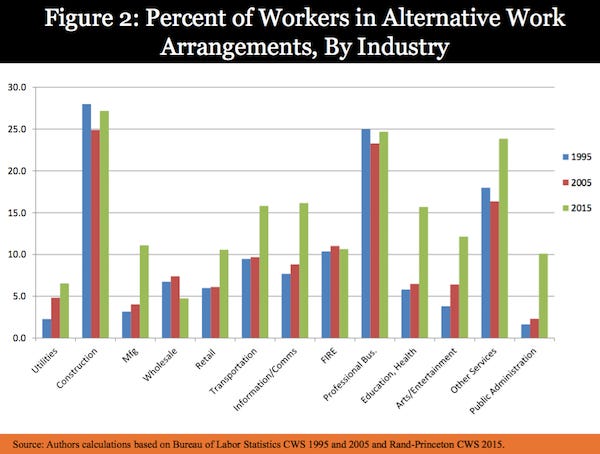Important question: Where were you when BuzzFeed exploded the watermelon?
Happened in an Uber.
There is a category of stories which I like to refer to as Happened In An Uber. A good example is “Uber Driver Napped as His Passenger Led Highway Chase, Police Say,” a short entry in last Wednesday’s New York Times. Juan Carlos was taking Uber from Philadelphia to New York when he assumed control of the steering wheel so that his driver could nap. At some point, Carlos began speeding, attracted a police chase, refused to cede the wheel when his driver woke up, and crashed into a guard rail in Colesville, New York. (Both he and the driver are fine.) This is quite the story! Police and cars and high-speed chases. Still, I wonder whether the Times would care had it Happened In A Taxi.
Settling up.
Uber is paying $25 million to settle “unlawful business practices” that were being prosecuted by the San Francisco and Los Angeles district attorneys. The settlement covers a couple things, but the focus is Uber’s background checks, which the company for a long time claimed were “industry leading,” even though they weren’t. Over in San Francisco, DA George Gascón is hailing this as a win. “The result we have achieved today goes well beyond its impact on Uber,” he says in a prepared statement. “It sends a clear message to all businesses, and to startups in particular, that in the quest to quickly obtain market share, laws designed to protect consumers cannot be ignored.”
Does it? Uber is being asked to pay $10 million up front, and the “remaining $15 million will be waived at the end of two years” if it complies with all the settlement terms. For a company valued at more than $60 billion, that’s less a heavy penalty than a slap on the wrist. Keep in mind that Uber achieved its lofty valuation in part by sidestepping local regulations and occasionally flouting the law in the name of rapid expansion, and I can’t imagine Travis is sitting around now saying gosh, that really wasn’t worth it. Quite the contrary to Gascón, the message seem to be that if you ignore the rules to win the market, you’ll probably be able to afford the penalties by the time they roll around.
Elsewhere in ride-hailing lawsuits, Lyft’s attempt to settle a major class action over whether its drivers were independent contractors or employees has been rejected by a federal judge. The preliminary settlement awarded $12.25 million to drivers and set aside 30% for attorneys’ fees. It also required Lyft to make some changes to its model, most significantly, making it more difficult to terminate—er, “deactivate”—drivers. What went wrong? Basically, Lyft grew a lot in California over the last nine months, but that wasn’t accounted for in the settlement amount, and the judge thinks drivers got screwed. You can read a fuller synopsis here, though be warned that there is a decent amount of math.
WeLive.
WeWork, the shared-office space company recently valued at $16 billion, has officially launched its co-living concept, WeLive. It is the next step in the WeMovement, though co-founder Miguel McKelvey cautions that this “is an experiment, not a conclusion.” The first WeLive is located on Wall Street, and Forbes took a tour. There is beer and ping pong and a wellness room for Barre classes. The aesthetic is “reformed bro meets upscale Ikea.” A bed in the living room costs $1,375; private rooms start at $2,000. Perhaps this seems expensive, but rent in the WeWorld cannot be measured in square footage. “A desk for $350 a month in a common area is not as cheap as a coffee shop,” McKelvey says. “But a lot of people would say they’re empowered by that environment in a way that makes it worth it.”
Gig’s up.
The Uber economy might just be Uber, but it’s still a lot of what we talk about, even though the much bigger issue is the rapid growth of alternative work in America. Alternative work is an catch-all term for non-standard jobs—in other words, transient employment without the social safety nets that we usually expect in the workforce. And economists Larry Katz and Alan Krueger think it could be responsible for “all of the net employment growth in the US economy from 2005 to 2015.” Many of these jobs offer increased flexibility. But they could also drag down labor and wage standards. Is alternative work good? Is it harmful? We need more research on that question, because the only certainty is that it’s growing.
Other stuff.
World’s first fully autonomous taxi fleet to launch in Singapore this year. Didi Kuaidi now worth $25 billion. Managed by Q raises $25 million. Catch your unicorn, then hang on to it. Uber gets a patent. Uber takes cash. Uber gives cash. Arianna’s sleep prison. Sharing economy doesn’t share. Airbnb begs to differ. Grow your own bugs, eat them in stir fry. “Bagged lettuce seemed like a fad, too.”
Thanks again for subscribing to Oversharing! If you, in the spirit of the sharing economy, would like to share this newsletter with a friend, you can direct them to sign up here. Send tips, comments, and exploding watermelons to oversharingstuff@gmail.com.



